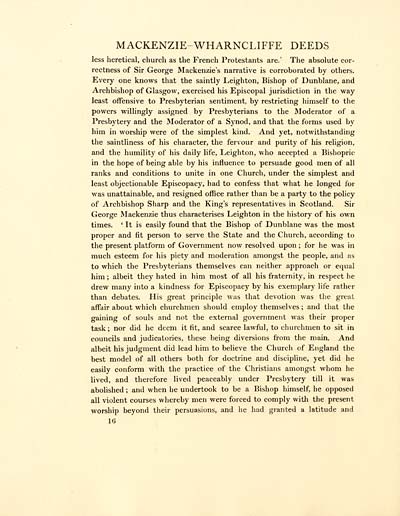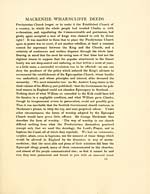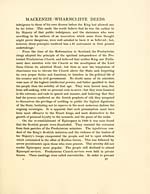Download files
Complete book:
Individual page:
Thumbnail gallery: Grid view | List view

MACKENZIE-WHARNCLIFFE DEEDS
less heretical, church as the French Protestants are.' The absolute cor-
rectness of Sir George Mackenzie's narrative is corroborated by others.
Every one knows that the saintly Leighton, Bishop of Dunblane, and
Archbishop of Glasgow, exercised his Episcopal jurisdiction in the way
least offensive to Presbyterian sentiment, by restricting himself to the
powers willingly assigned by Presbyterians to the Moderator of a
Presbytery and the Moderator of a Synod, and that the forms used by
him in worship were of the simplest kind. And yet, notwithstanding
the saintliness of his character, the fervour and purity of his religion,
and the humility of his daily life, Leighton, who accepted a Bishopric
in the hope of being able by his influence to persuade good men of all
ranks and conditions to unite in one Church, under the simplest and
least objectionable Episcopacy, had to confess that what he longed for
was unattainable, and resigned office rather than be a party to the policy
of Archbishop Sharp and the King's representatives in Scotland. Sir
George Mackenzie thus characterises Leighton in the history of his own
times. ' It is easily found that the Bishop of Dunblane was the most
proper and fit person to serve the State and the Church, according to
the present platform of Government now resolved upon ; for he was in
much esteem for his piety and moderation amongst the people, and as
to which the Presbyterians themselves can neither approach or equal
him ; albeit they hated in him most of all his fraternity, in respect he
drew many into a kindness for Episcopacy by his exemplary life rather
than debates. His great principle was that devotion was the great
affair about which churchmen should employ themselves ; and that the
gaining of souls and not the external government was their proper
task ; nor did he deem it fit, and scarce lawful, to churchmen to sit in
councils and judicatories, these being diversions from the main. And
albeit his judgment did lead him to believe the Church of England the
best model of all others both for doctrine and discipline, yet did he
easily conform with the practice of the Christians amongst whom he
lived, and therefore lived peaceably under Presbytery till it was
abolished ; and when he undertook to be a Bishop himself, he opposed
all violent courses whereby men were forced to comply with the present
worship beyond their persuasions, and he had granted a latitude and
16
less heretical, church as the French Protestants are.' The absolute cor-
rectness of Sir George Mackenzie's narrative is corroborated by others.
Every one knows that the saintly Leighton, Bishop of Dunblane, and
Archbishop of Glasgow, exercised his Episcopal jurisdiction in the way
least offensive to Presbyterian sentiment, by restricting himself to the
powers willingly assigned by Presbyterians to the Moderator of a
Presbytery and the Moderator of a Synod, and that the forms used by
him in worship were of the simplest kind. And yet, notwithstanding
the saintliness of his character, the fervour and purity of his religion,
and the humility of his daily life, Leighton, who accepted a Bishopric
in the hope of being able by his influence to persuade good men of all
ranks and conditions to unite in one Church, under the simplest and
least objectionable Episcopacy, had to confess that what he longed for
was unattainable, and resigned office rather than be a party to the policy
of Archbishop Sharp and the King's representatives in Scotland. Sir
George Mackenzie thus characterises Leighton in the history of his own
times. ' It is easily found that the Bishop of Dunblane was the most
proper and fit person to serve the State and the Church, according to
the present platform of Government now resolved upon ; for he was in
much esteem for his piety and moderation amongst the people, and as
to which the Presbyterians themselves can neither approach or equal
him ; albeit they hated in him most of all his fraternity, in respect he
drew many into a kindness for Episcopacy by his exemplary life rather
than debates. His great principle was that devotion was the great
affair about which churchmen should employ themselves ; and that the
gaining of souls and not the external government was their proper
task ; nor did he deem it fit, and scarce lawful, to churchmen to sit in
councils and judicatories, these being diversions from the main. And
albeit his judgment did lead him to believe the Church of England the
best model of all others both for doctrine and discipline, yet did he
easily conform with the practice of the Christians amongst whom he
lived, and therefore lived peaceably under Presbytery till it was
abolished ; and when he undertook to be a Bishop himself, he opposed
all violent courses whereby men were forced to comply with the present
worship beyond their persuasions, and he had granted a latitude and
16
Set display mode to:
![]() Universal Viewer |
Universal Viewer | ![]() Mirador |
Large image | Transcription
Mirador |
Large image | Transcription
Images and transcriptions on this page, including medium image downloads, may be used under the Creative Commons Attribution 4.0 International Licence unless otherwise stated. ![]()
| Histories of Scottish families > Ancient deeds and other writs in the Mackenzie-Wharncliffe charter-chest > (38) Page 16 |
|---|
| Permanent URL | https://digital.nls.uk/95523821 |
|---|
| Description | A selection of almost 400 printed items relating to the history of Scottish families, mostly dating from the 19th and early 20th centuries. Includes memoirs, genealogies and clan histories, with a few produced by emigrant families. The earliest family history goes back to AD 916. |
|---|

